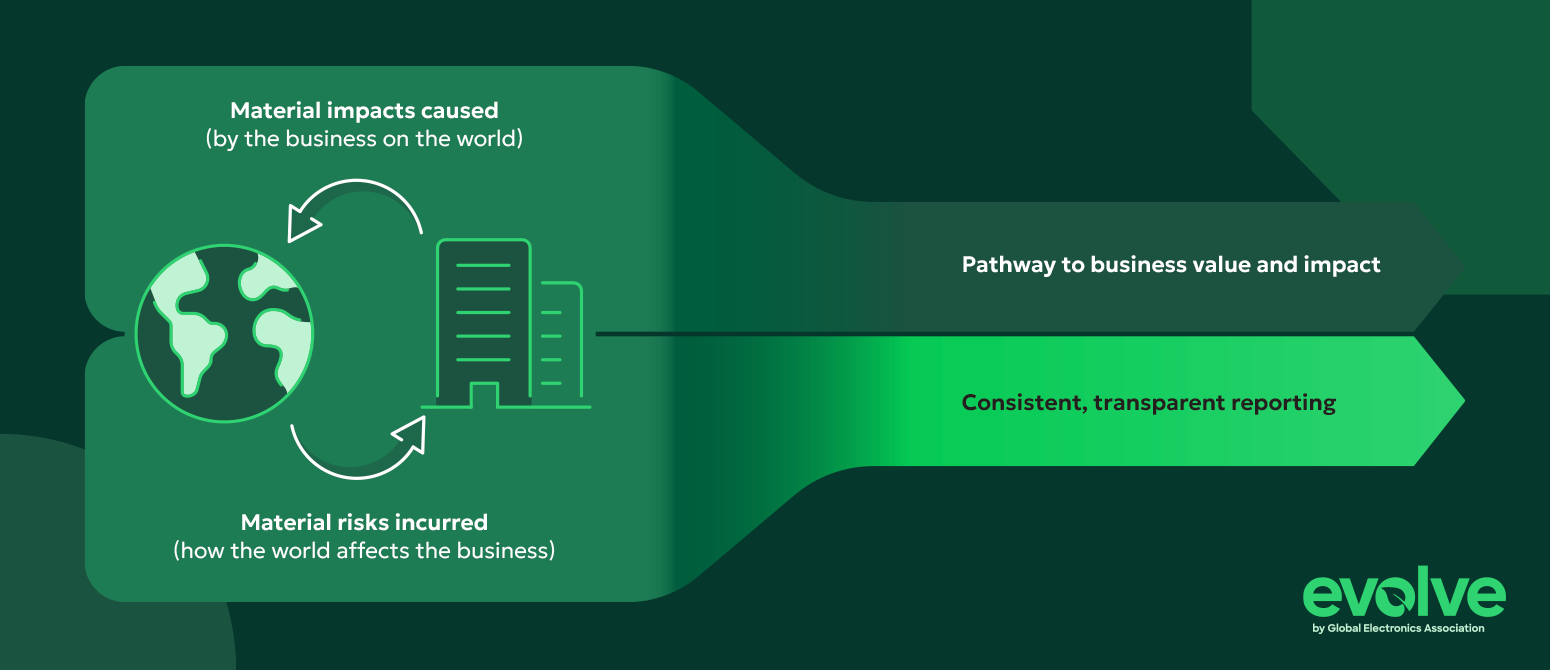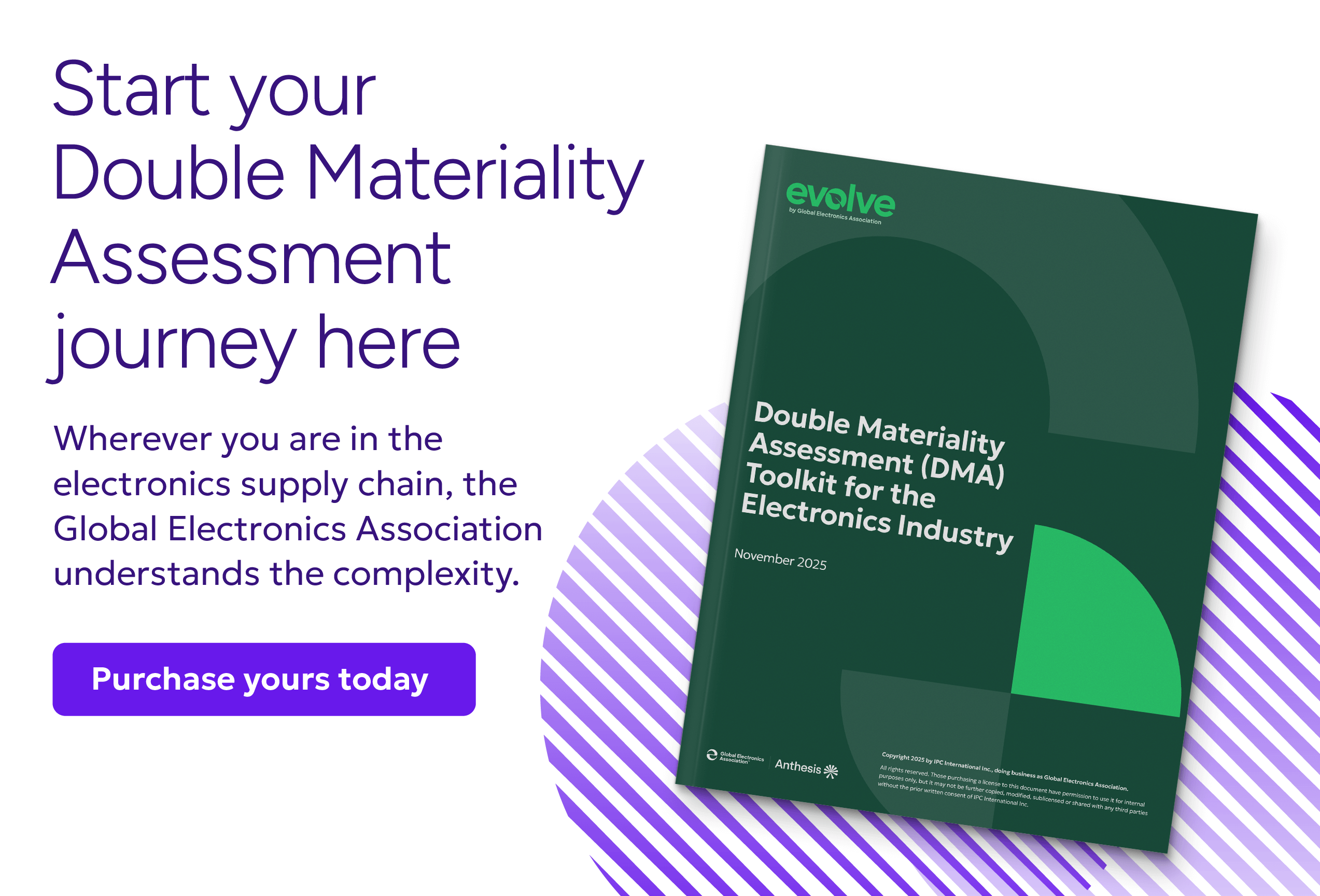Each Double Materiality Assessment (DMA) Toolkit offers comprehensive guidance developed by the Global Electronics Association to help your teams conduct a Corporate Sustainability Reporting Directive (CSRD)-aligned DMA efficiently and effectively.
The value our DMA Toolkit promises to offer:
- Helps you save time and resources and avoid months of desktop research.
- Ensures you create a complete assessment and reduce the risk of missing vital material issues within your supply chain.
- Assists you in focusing on what matters most to your operations.
- Aligns with best practices by following European Financial Reporting Advisory Group (EFRAG)-aligned methodology developed with input from industry members and sustainability experts.
Why act now on the complex and urgent challenge of CSRD compliance?
Your supply chain partners are asking questions now
Electronics supply chains are highly interconnected. Your customers and suppliers are conducting their own DMAs today and need to understand your material topics. Companies with mature materiality assessments strengthen commercial relationships while those without could miss out on opportunities.
Getting started now is critical - reporting timelines are imminent
Conducting a DMA requires extensive research. This toolkit provides the industry context needed to get started immediately, with best practices for stakeholder engagement, materiality scoring, and assurance preparation rather than desk research that's already been done for you.
Complex supply chains demand early preparation
You’ll require extensive documentation to satisfy assurance requirements. Auditors need to trace material topics through multiple tiers – from raw material extraction through to end-of-life disposal. Early DMA completion allows time for comprehensive evidence gathering that rushed timelines can’t accommodate.
The CSRD requires companies of a certain size or turnover to conduct DMAs. With hundreds of pages to understand across the European Sustainability Reporting Standards (ESRS), electronics companies face unique and pressing challenges.
Our DMA Toolkit provides the electronics industry the context you need to accelerate your DMA process.

Start your DMA with a solid foundation. The DMA Toolkit includes:
DMA Project Plan
A 6-month implementation roadmap including:
- Four-phase process (Context → Identify → Assess → Prioritise)
- Week-by-week timeline and deliverables
- Stakeholder engagement guidance
- Recommended team structure and expert collaboration
- Industry member insights on common pain points
Sustainability Context Report for the Electronics Industry
Comprehensive sustainability context for the entire electronics industry
- Pre-identified sustainability issues across Environmental, Human Rights, and Governance dimensions
- Issues mapped to ESRS topics and sub-topics
- Coverage of the full electronics supply chain and product lifecycle, from original equipment manufacturers (OEM) upstream to printed circuit board (PCB) fabricators.
- Dependencies on natural, human, and social capital
- Developed through analysis of 100+ industry sources
Scoring Impacts, Risks and Opportunities (IROs)
Developed to support companies in the electronics industry to assess the significance of their sustainability-related impacts, risks, and opportunities, as part of a CSRD-aligned DMA. This serves as a practical guide with sample scoring frameworks, methodologies, and materiality threshold guidance.
The DMA Toolkit covers industry-relevant issues and dependencies across the electronics supply chain along with sub-industry specific product lifecycle, business activities, and relationship insights.
Don't spend months researching what's already been mapped for the electronics industry. Start your DMA journey today.
Get started on your DMA
Industry-built and expert-validated, the DMA Toolkit – created by the Global Electronics Association, Anthesis Group, and leading electronics companies – gives you a practical, electronics-specific starting point for CSRD compliance.
A DMA is a core requirement of the European Union's Corporate Sustainability Reporting Directive (CSRD) and expands the traditional focus on financial materiality in sustainability reporting. DMAs compel companies to identify and assess their actual or potential impacts related to environmental, societal, and economic sustainability matters (impact materiality), and sustainability matters that affect or may affect their current or future financial performance (financial materiality).
Impact Materiality: This assesses how a company's activities have actual or potential impacts related to environmental, societal, and economic sustainability matters, encompassing both positive and negative consequences. This "inside-out" view considers a company's short-, medium-, and long-term impacts across its entire value chain, from resource extraction to product disposal.
Financial Materiality: This aspect, a traditional "outside-in" perspective, evaluates how environmental and social sustainability matters can affect or may affect the company’s current or future financial performance. This includes risks associated with climate change, resource scarcity, and social unrest, and potential opportunities arising from the shift towards a more sustainable economy.
A DMA examines a company's environmental, social, and economic impacts (positive and negative) related to sustainability matters and assesses sustainability-related financial risks and opportunities. This analysis considers how a company's activities affect its surroundings and how sustainability issues can translate into financial losses or gains. For instance, climate regulations could pose financial risks, while resource efficiency could create cost-saving opportunities. By examining all three factors, DMAs provide a holistic view of a company's sustainability performance and its link to financial health.
The European Union's CSRD mandates DMAs for a wide range of companies with more than 500 employees, with phased-in compliance deadlines starting in 2024. However, DMAs offer a strategic opportunity that extends beyond mere compliance. By understanding the two-fold impact of their operations – how they affect the environment and society, and how these factors in turn influence their financial performance – companies can make informed decisions that benefit both their bottom line and the planet, set strategies to achieving positive outcomes and effectively take action that enables these benefits.
A comprehensive DMA hinges on effective engagement with both stakeholders and subject matter experts (SMEs). Stakeholders are individuals or groups like employees, leadership, customers, investors, and communities that offer valuable insights due to their connection to, or potential impact on, the organization's sustainability practices. SMEs are experts in their specialized areas like health and safety, human resources, product engineering, or waste management and bring a deep well of knowledge to the table, making them fundamentally important for informing the DMA process. By incorporating perspectives from both, organizations can gain a well-rounded understanding of their sustainability impact.
The Toolkit provides a comprehensive foundation for conducting a CSRD-aligned DMA, one of the most critical and complex steps in the reporting process. It aligns directly with the methodologies and expectations outlined by the European Financial Reporting Advisory Group (EFRAG). In short, the Toolkit enables companies to perform the DMA with confidence.
Yes. The Toolkit is designed to be scalable and practical for organizations of all sizes, including small and mid-sized electronics companies that may not have dedicated sustainability teams.
It provides structured guidance, sample timelines, and ready-to-use templates that smaller companies can easily adapt to their resources and operations. For many, it will significantly reduce the time and cost of getting started on their CSRD journey while ensuring that their DMA follows industry-specific best practices.
The Toolkit was developed to minimize dependence on external consultants by providing the tools, templates, and sector-specific insights needed to perform a robust DMA internally.
That said, some companies may still choose to engage external experts, especially if they have complex global supply chains, require support in collecting or verifying quantitative data (such as Scope 3 emissions), or need help preparing for third-party assurance. For many organizations, the Toolkit can serve as a strong starting point that streamlines and focuses any external engagement that follows.
If the organization chooses to limit its engagement with an external consultant, there are two key points in the DMA process where expert knowledge would add most value in aligning with the ESRS:
- Supporting the justification of scoring.
- Planning and engaging with audit controls and external assurance.
The Toolkit reflects the most up-to-date regulatory guidance and expectations available as of its release. It was developed in collaboration with Anthesis Group and informed by the latest EFRAG methodologies and European Commission guidance on CSRD implementation. Because CSRD and ESRS interpretations continue to evolve, the Global Electronics Association is committed to keeping the Toolkit and its companion Materiality Resource Hub current, incorporating new examples, templates, and updates as further regulatory clarifications emerge.

